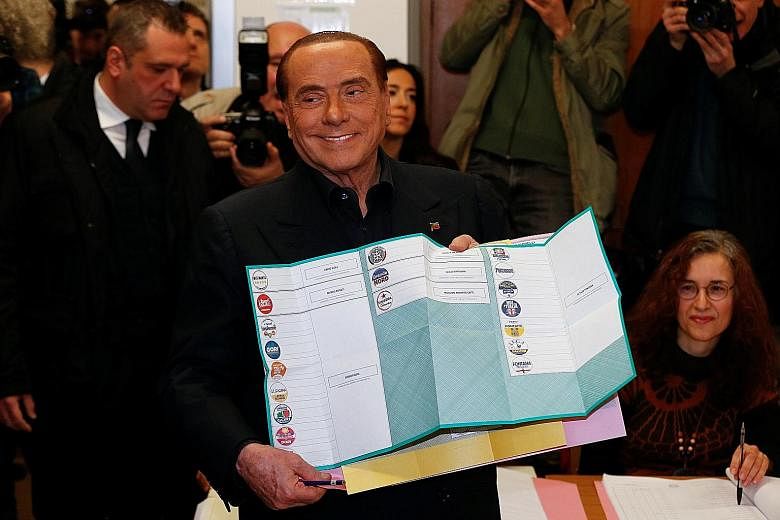ROME • Italians are bracing themselves for political gridlock after voting in an election marked by anger over the listless economy, high unemployment and immigration.
Yesterday's election may not produce a clear winner as opinion polls published before a Feb 17 blackout showed a hung Parliament as the most likely scenario.
Polling stations close at 11pm (6am Monday Singapore time), with exit polls due immediately afterwards. The vote is being held under a complex new electoral law that could mean the final result will not be clear until late today.
Long lines were reported in voting locations from Milan in the north to Palermo in Sicily, where several stations opened later because several thousand ballots had to be reprinted due to errors.
Pollsters have predicted that former prime minister Silvio Berlusconi's centre-right party, Forza Italia, and his far-right ally, the eurosceptic League, will emerge as the largest bloc in Parliament but will fall short of a majority.
The anti-establishment Five Star Movement looks set to be the biggest single party, feeding off discontent over entrenched corruption and growing poverty, while the ruling centre-left Democratic Party is seen limping home in third place.
A hung Parliament would trigger an extended period of horse-trading among the parties.
-
Three possible outcomes
-
A RIGHT-WING COALITION
"It is unlikely that any of the three main contenders will be able to obtain a majority, but there is only one that can, and it's the right," said Professor Roberto D'Alimonte, director of the political science department of Rome's Luiss University.
The right-wing coalition brings together four parties, the biggest of which are Mr Silvio Berlusconi's centre-right Forza Italia (Go Italy) and the far-right League headed by Mr Matteo Salvini.
An agreement between Mr Berlusconi and Mr Salvini says that whichever of the two parties comes first will lead the government, should the coalition win a majority.
Banned from public office because of a tax fraud probe, Mr Berlusconi has said that if the coalition wins a majority and his party comes first, he would like to see European Parliament president Antonio Tajani, his former protege, lead the government.
If the League comes out on top, Mr Salvini will be premier.
A GRAND COALITION
Brussels is betting on a German-style grand coalition between Forza Italia and the centre-left Democratic Party, both pro-European Union parties. Neither Mr Berlusconi nor Democratic Party leader Matteo Renzi have dared suggest that they might enter into such an agreement during the campaign, but it is exactly what happened after the last general election in 2013.
NO PARLIAMENTARY MAJORITY
The last available polls from the middle of last month gave the right-wing coalition 37 per cent of the votes, of which 17 per cent were for Forza Italia and 13 per cent for the League.
The Five Star Movement was predicted to get 28 per cent, followed by 27 per cent for the centre-left coalition led by the Democratic Party, but with millions still undecided.
If there is no new majority in Parliament, Mr Paolo Gentiloni of the Democratic Party would remain as prime minister.
Meanwhile, President Sergio Mattarella will consult the various parliamentary groups to see if there is a figure who can command a majority, and if not, new elections could be called.
AGENCE FRANCE-PRESSE
Heavily indebted Italy is the third-largest economy in the 19-member euro zone and although investors have been sanguine ahead of the ballot, prolonged political stalemate could reawaken the threat of market instability.
"I'd like to see the parties work together more for the good of the country... There was too much mud-slinging during the campaign," said 20-year-old Luca Hammad while leaving a polling station in Rome.
"I hope these elections bring change for young people. Even if you find a job, wages are so low that it is hardly worth working."
Five Star leader Luigi Di Maio, 31, has vowed not to seek a coalition deal but appealed to rivals to back him if his party wins the most votes.
"Five Star Movement is transforming the political landscape," said political science professor Roberto D'Alimonte from Rome's Luiss University. "If the centre-right doesn't get a majority, a lot will depend on whether Five Star opens up to the idea of a coalition."
The campaign has also marked the remarkable comeback of three-time prime minister Berlusconi, who was forced to quit in 2011 at the height of a sovereign debt crisis and was widely written off after sex scandals, legal woes and ill health.
A 2013 conviction for tax fraud means the 81-year-old cannot hold public office and he has put forward Mr Antonio Tajani, president of the European Parliament, as his candidate for prime minister.
Mr Tajani's moderate profile is aimed at allaying fears in Europe about his populist allies, notably the League, whose leader Matteo Salvini has promised to deport the 600,000 boat migrants who have arrived in Italy over the past four years.
Populist parties have been on the rise across Europe since the 2008 financial crisis. Last year, French President Emmanuel Macron and Dutch Prime Minister Mark Rutte held off the challenge of eurosceptic populists in national elections. Chancellor Angela Merkel's party remained the biggest force in the German Parliament despite the rise of the anti-immigrant AfD.
But mainstream parties in Italy have found it especially hard to contain voter anger, with the economy still 6 per cent smaller than a decade ago and unemployment stuck at about 11 per cent.
Although all party leaders have ruled out any post-election alliances with rivals, Italy - which has seen 65 governments since World War II - has a long history of finding a way out of apparently intractable political stalemate.
Another possibility could be a temporary government and eventually, new elections.
REUTERS, BLOOMBERG

